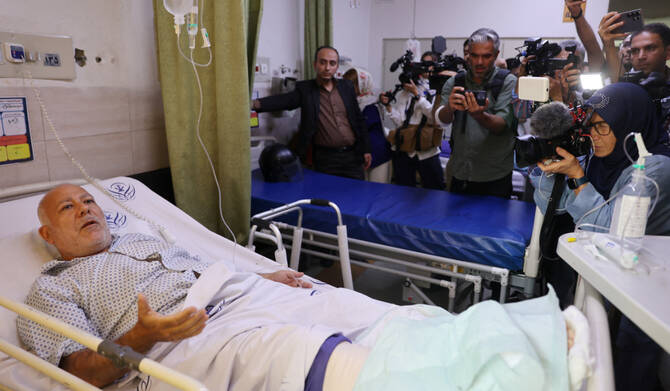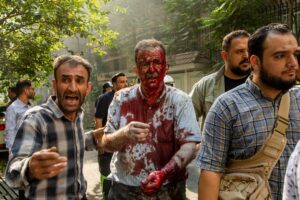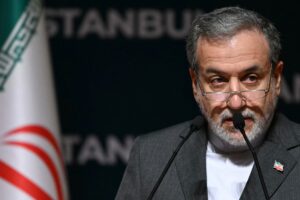



TEHRAN: Tehran threatened on Monday to inflict “serious” damage in retaliation for US strikes on the Islamic republic’s nuclear facilities, as the Iran-Israel war entered its 11th day despite calls for de-escalation.
Aerial assaults meanwhile raged on, with air raid sirens sounding across Israel and AFP journalists reporting several blasts were heard over Jerusalem.
The Israeli military said it had struck missile sites in western Iran as well as “six Iranian regime airports” across the country, destroying fighter jets and helicopters.
President Donald Trump said US warplanes used “bunker buster” bombs to target sites in Fordo, Isfahan and Natanz, boasting the strikes had “obliterated” Iran’s nuclear capabilities.
Other officials said it was too soon to assess the true impact on Iran’s nuclear program, which Israel and some Western states consider an existential threat.
Iranian armed forces spokesman Ebrahim Zolfaghari said on state television that the US “hostile act,” following more than a week of Israeli bombardments, would “pave the way for the extension of war in the region.”
“The fighters of Islam will inflict serious, unpredictable consequences on you with powerful and targeted (military) operations,” he warned.

Israeli strikes on Iran kill at least 950, wound 3,450 others, says human rights group
Israeli strikes on Iran have killed at least 950 people and wounded 3,450 others, a human rights group said Monday.
The Washington-based group Human Rights Activists offered the figures, which covers the entirety of Iran. It said of those dead, it identified 380 civilians and 253 security force personnel being killed.
Human Rights Activists, which also provided detailed casualty figures during the 2022 protests over the death of Mahsa Amini, crosschecks local reports in the Islamic Republic against a network of sources it has developed in the country.
Iran has not been offering regular death tolls during the conflict and has minimized casualties in the past. On Saturday, Iran’s Health Ministry said some 400 Iranians had been killed and another 3,056 wounded in the Israeli strikes.
Iran foreign minister to meet key ally Putin

Iran foreign minister Abbas Araghchi described Sunday’s attacks “lawless and criminal” behavior. (AFP)
Iranian Foreign Minister Abbas Araghchi was due to hold “important” talks with key ally Vladimir Putin on Monday, 48 hours after a major US attack on Iran’s key nuclear facilities.
Moscow is a crucial backer of Tehran, but has not swung forcefully behind its partner since Israel launched a wave of attacks on June 13, strikes that triggered Iran to respond with missiles and drones.
While Russia condemned the Israeli and US strikes, it has not offered military help and has downplayed its obligations under a sweeping strategic partnership agreement signed with Tehran just months ago.
“In this new dangerous situation … our consultations with Russia can certainly be of great importance,” Russian state media reported Araghchi as saying after landing in Moscow.
Australia says it supports US strike, calls for return to diplomacy
Australia’s Prime Minister Anthony Albanese said on Monday that Canberra supported the United States strike on Iran and called for de-escalation and a return to diplomacy.
“The world has long agreed that Iran cannot be allowed to get a nuclear weapon and we support action to prevent that,” Albanese told reporters in Canberra on Monday.
Albanese said “the information has been clear” that Iran had enriched uranium to 60 percent and “there is no other explanation for it to reach 60, other than engaging in a program that wasn’t about civilian nuclear power.”
The International Atomic Energy Agency, the UN nuclear watchdog that inspects Iran’s nuclear facilities, reported on May 31 that Iran had enough uranium enriched to up to 60 percent, if enriched further, for nine nuclear weapons.
“Had Iran complied with the very reasonable requests that were made, including by the IAEA, then circumstances would have been different,” said Albanese, referring to limitations on enrichment.
Agencies